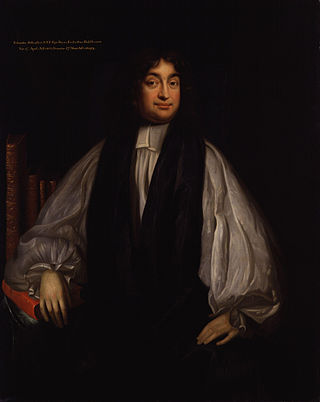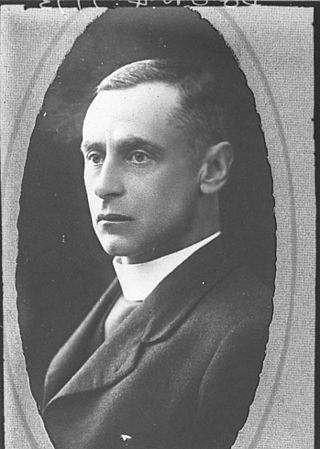
Anglo-Catholicism comprises beliefs and practices that emphasise the catholic heritage and identity of the various Anglican churches.

An antiphon is a short chant in Christian ritual, sung as a refrain. The texts of antiphons are usually taken from the Psalms or Scripture, but may also be freely composed. Their form was favored by St Ambrose and they feature prominently in Ambrosian chant, but they are used widely in Gregorian chant as well. They may be used during Mass, for the Introit, the Offertory or the Communion. They may also be used in the Liturgy of the Hours, typically for Lauds or Vespers.

Nicholas Patrick Stephen Wiseman was a Cardinal of the Catholic Church who became the first Archbishop of Westminster upon the re-establishment of the Catholic hierarchy in England and Wales in 1850.

Edward Stillingfleet was a British Christian theologian and scholar. Considered an outstanding preacher as well as a strong polemical writer defending Anglicanism, Stillingfleet was known as "the beauty of holiness" for his good looks in the pulpit, and was called by John Hough "the ablest man of his time".

Samuel Davidson was an Irish biblical scholar.

Joseph Hergenröther was a German Church historian and canonist, and the first Cardinal-Prefect of the Vatican Archive.

Church music is Christian music written for performance in church, or any musical setting of ecclesiastical liturgy, or music set to words expressing propositions of a sacred nature, such as a hymn.

The Liturgy of the Hours, Divine Office, or Opus Dei are a set of Catholic prayers comprising the canonical hours, often also referred to as the breviary, of the Latin Church. The Liturgy of the Hours forms the official set of prayers "marking the hours of each day and sanctifying the day with prayer." The term "Liturgy of the Hours" has been retroactively applied to the practices of saying the canonical hours in both the Christian East and West–particularly within the Latin liturgical rites–prior to the Second Vatican Council, and is the official term for the canonical hours promulgated for usage by the Latin Church in 1971. Before 1971, the official form for the Latin Church was the Breviarium Romanum, first published in 1568 with major editions through 1962.

The Bampton Lectures at the University of Oxford, England, were founded by a bequest of John Bampton. They have taken place since 1780.
Samuel Parker was an English churchman, of strong Erastian views and a fierce opponent of Dissenters. His political position is often compared with that of Thomas Hobbes, but there are also clear differences; he was also called in his time a Latitudinarian, but this is not something on which modern scholars are agreed. During the reign of King James II he served as Bishop of Oxford, and was considered by James to be a moderate in his attitude to Catholics.

The Hulsean Lectures were established from an endowment made by John Hulse to the University of Cambridge in 1790. At present, they consist of a series of four to eight lectures given by a university graduate on some branch of Christian theology.

William Augustus Muhlenberg was an Episcopal clergyman and educator. Muhlenberg is considered the father of church schools in the United States. An early exponent of the Social Gospel, he founded St. Luke's Hospital in New York City. Muhlenberg was also an early leader of the liturgical movement in Anglican Christianity. His model schools on Long Island had a significant impact on the history of American education. Muhlenberg left his work in secondary education in 1845.

Liturgical music originated as a part of religious ceremony, and includes a number of traditions, both ancient and modern. Liturgical music is well known as a part of Catholic Mass, the Anglican Holy Communion service and Evensong, the Lutheran Divine Service, the Orthodox liturgy, and other Christian services, including the Divine Office.
Timeline for Music of Italy

Prayer in the Catholic Church is "the raising of one's mind and heart to God or the requesting of good things from God." It is an act of the moral virtue of religion, which Catholic theologians identify as a part of the cardinal virtue of justice.
Ambrose Lisle March Phillipps de Lisle was a British Roman Catholic convert. He founded Mount St Bernard Abbey, a Trappist abbey in Leicestershire, and worked for the reconversion or reconciliation of Britain to Catholicism.
Protestantism is the largest religious demographic in the United Kingdom.
James Spencer Northcote was an English Catholic priest and writer. He served as president of St Mary's College, Oscott for seventeen years.
Richard Frederick Littledale was an Anglo-Irish clergyman and writer.
Church music during the Reformation developed during the Protestant Reformation in two schools of thought, the regulative and normative principles of worship, based on reformers John Calvin and Martin Luther. They derived their concepts in response to the Catholic church music, which they found distracting and too ornate. Both principles also pursued use of the native tongue, either alongside or in place of liturgical Latin.











